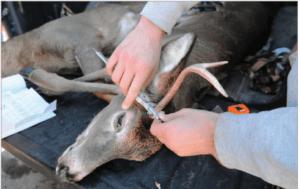Saturday, Nov. 12 — STATEWIDE — Hunters are gearing up for the start of Vermont’s traditionally popular 16-day regular deer season that begins Saturday, Nov. 12 and ends Sunday, Nov. 27.
A hunter may take one legal buck during this season if they did not already take one during the archery deer season. The definition of a legal buck depends on the Wildlife Management Unit (WMU). A map of the WMUs is on pages 22 and 23 of the 2022 Vermont Hunting & Trapping Guide available from license agents statewide.
In WMUs C, D1, D2, E1, E2, G, I, L, M, P, and Q a legal buck is any deer with at least one antler 3 inches or more in length.

Hunters who get a deer on opening weekend of the Nov. 12-27 deer season can help Vermont’s
deer management program by reporting their deer at a biological check station.
In WMUs A, B, F1, F2, H, J1, J2, K, N, and O a legal buck is any deer with at least one antler with two or more antler points 1 inch in length or longer.
“The greatest numbers of deer continue to be in western regions of the state and other valley areas,” said Vermont Fish &Wildlife’s deer biologist Nick Fortin. “The Green Mountains and Northeast Kingdom offer more of a big woods experience with fewer, but often larger, deer.”
Vermont hunting licenses include a buck tag for this season and a late season bear tag (for Nov. 12-20), and cost $28 for residents and $102 for nonresidents. Hunters under 18 years of age get a break at $8 for residents and $25 for nonresidents. Licenses are available on Fish & Wildlife’s website and from license agents statewide.
“I am urging all hunters to wear a fluorescent orange hat and vest to help maintain Vermont’s very good hunting season safety record,” said Vermont Fish & Wildlife Commissioner Christopher Herrick.
A 2022 Deer Season Hunting Guide can be downloaded from the department’s website at vtfishandwildlife.com. The guide includes a map of the Wildlife Management Units (WMUs), season dates, regulations, and other helpful information.
Hunters are required to report deer in person at a big game reporting station during the regular season. Online reporting will not be available. This requirement allows biologists to collect important information from as many deer as possible.
Hunters who get a deer on Nov. 12 or 13 can help Vermont’s deer management program by reporting their deer at one of the biological check stations that will be staffed from 9 a.m. to 7 p.m., unless the store closes earlier:
- Buck Stop Mini Mart – Bennington
- Keith’s Country Store – Pittsford
- R&L Archery – Barre
- Putney Sunoco – Putney
- West Enosburg Country Store – Enosburg
- Falls Rack N Reel – New Haven
- Bob’s Quick Stop – Irasburg Lead & Tackle – Lyndonville
- Village Grocery & Deli – Waitsfield
- Singleton’s Store – Proctorsville
Hunters who do not go to a biological reporting station are asked to provide a tooth from their deer. Obtain a tooth envelope from your regular reporting agent. Remove one of the middle incisor teeth, being careful to include the root. Place the tooth in the envelope and give it to the reporting agent. Each tooth will be cross sectioned to accurately determine the deer’s age, and the results will be posted on the Fish &Wildlife website next spring.




